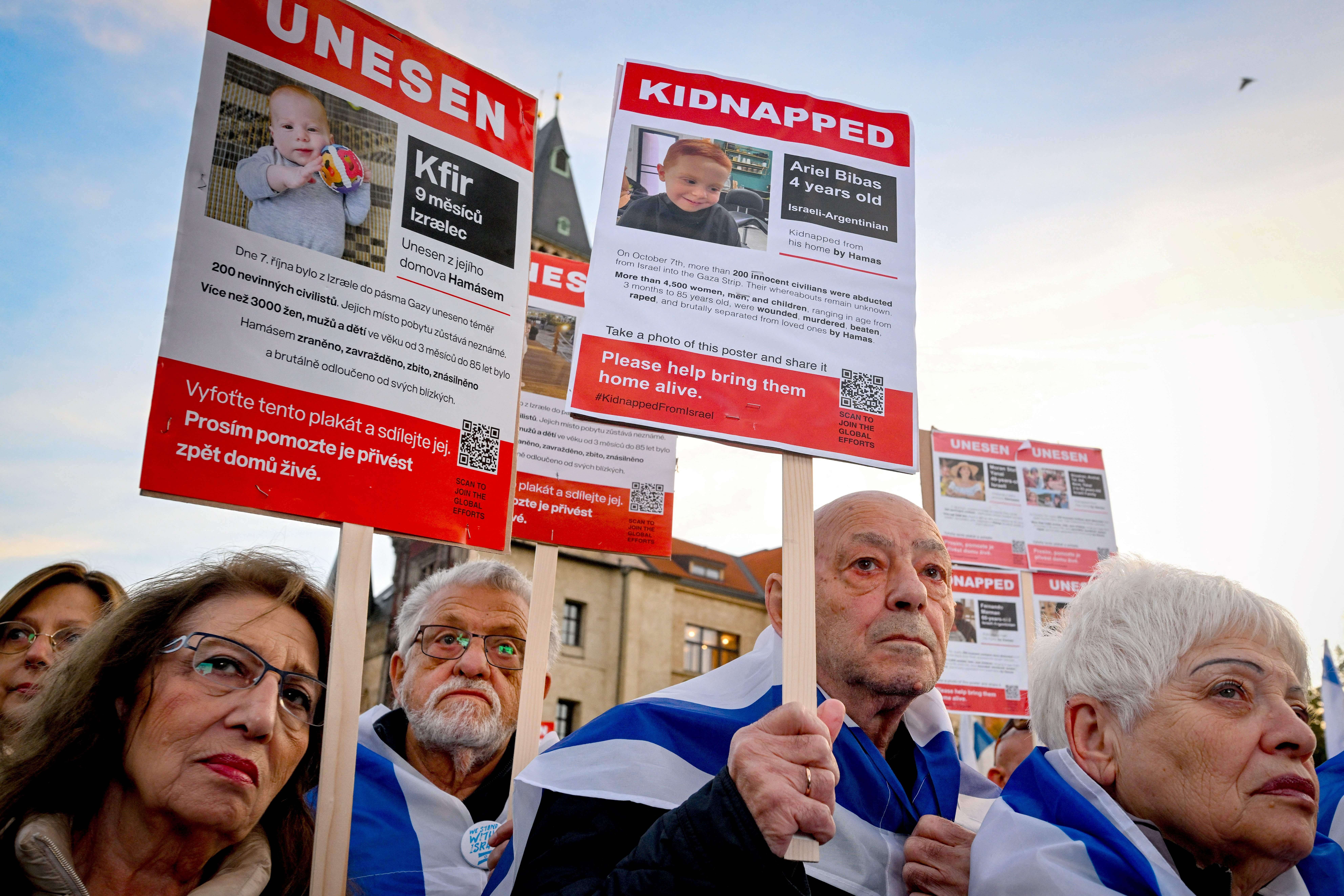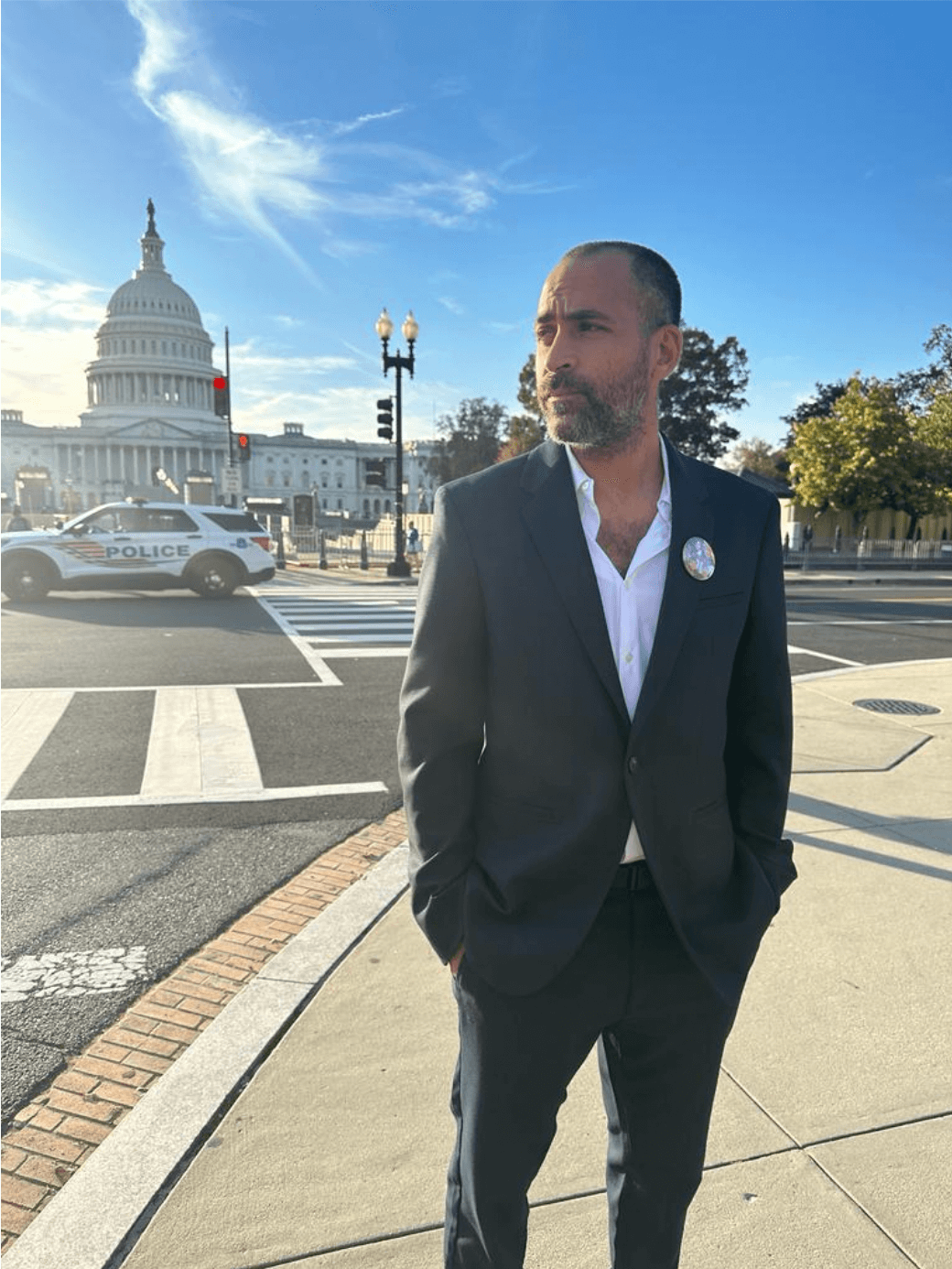Hamas just released 24 hostages. Where are the rest of our children?
By dragging out the release of Israeli children, the terrorists continue to torment us

Demonstrators in Prague hold up placards with images of Kfir (left) and Ariel (right) Bibas, young children who were kidnapped in the Oct. 7 terror attacks in southern Israel. Photo by Michal Cizek/AFP via Getty Images
I have six children, almost all of whom are redheads. And in their young faces, I see the faces of the Bibas boys.
One of the first publicized horrors of Oct. 7 was of Shiri Bibas, distraught and crying as she holds her two small redheaded children, infant Kfir and 4-year-old Ariel. She was kidnapped by terrorists who infiltrated southern Israel, and video footage of the worst moment of her life was aired on Palestinian television and widely circulated on social media.
Every Jewish mother and father, every Jewish grandparent and loving adult, sees their own children and relatives in the eyes of the children who were captured on Black Shabbat.
The entire nation of Israel, and Jewish people everywhere, were waiting anxiously for today’s hostage release. The children’s hospitals were prepared and ready, stocked with toys and treats. The Ministry of Welfare released guidance about how soldiers and Israeli officials should interact with the children being released.
“Soldiers can offer a hand or a hug,” it says, “but they are not to lift or hold a child without his or her permission. If there is no choice, then the soldier must talk them through it, and say ‘I’m going to hold you because…’”
But only four children were released today. At least 20 more remain in Gaza — we hope. We have no way of knowing if they’re even alive.
It’s a relief to see several elderly Israeli women, Thai and Filipino agricultural workers, and other innocent people back on Israeli soil and safe and sound. But there is fear, anger and sadness about the fate of the other hostages who remain in Gaza, especially the youngest among them.
Where are all the children?

Every time I hug my 10-year-old daughter, I think about Ofri Brodetz, a girl who just turned 10 years old. She had a party planned the weekend of Oct. 7. Of course, it never happened. Instead, many of her friends and neighbors were murdered. And she, along with her mother and two siblings, was kidnapped.
Every time I look at my 8-year-old son, I see her little brother Yuval, who is also 8 years old. And every time I yell at my 4-year-old, I think about Oria Brodetz, Ofri and Yuval’s youngest brother, who is also 4 years old.
Several weeks ago, I spent the day with their father, Avihai Brodetz. He had been out defending their community on Oct. 7, and returned home to find his entire family missing. We were on Capitol Hill meeting with senators, sharing the story of his family and others to tell U.S. lawmakers what happened that day.
He told us that Ofri had been looking forward to opening her birthday presents, including a guitar that’s still waiting for her. Her father plays it now, alone, thinking of her every waking moment.
Brodetz told me about how sensitive his middle son is, and that he worries a great deal about how he’s emotionally handling captivity in the tunnels of Gaza. My 8-year-old son is sensitive, too. I can’t imagine how he could function after spending almost 50 days in a dark tunnel with murderers.
Telling me about Oria, Brodetz laughed. He said he’d never take for granted again being able to yell at him for causing trouble, as 4-year-olds are very good at doing.
At the mercy of terrorists
Yagil Yaakov, 12, and Or Yaakov, 16, were home alone on Kibbutz Nir Oz when terrorists were able to break in. The two brothers called their mother, Renana Gome, whispering from the sealed room where they were hiding. The last thing their mother heard them say before being taken captive was Yagil telling his captors, “Don’t take me, I’m too young.”
Yagil later appeared in a hostage video released by Palestinian Islamic Jihad. The two brothers were captured.
Initial reports from Israeli media indicated that the first hostages released by Hamas would be those captured from Kibbutz Nir Oz. When I heard this, I was hopeful: Shiri Bibas and her husband Yarden, along with their two small sons, were among those kidnapped on the kibbutz, along with many other small children, like 3-year-old twins Emma and Julie, along with their parents Sharon and David Cunio.
Thankfully, Sharon Cunio’s sister, Danielle Aloni, and her 6-year-old daughter Emilia were freed. So was Ohad Munder Zichri, a boy who also turned 9 years old while in captivity, along with his mother and grandmother. And so was Doron Katz Asher, along with her daughters Raz and Aviv, who are 4 and 2 years old, respectively.
And yet so many remain hostage in Gaza. Kfir Bibas, for example, has now spent a significant portion of his young life underground.
We know that trauma has a profound impact on a child’s development. And Hamas terrorists know this, too.
They understand Israelis and Jews are desperate to see every young child returned as quickly as possible. By dragging out their release, Hamas is tormenting those desperate to help the children begin to heal from the horrors they’ve experienced. We are at their mercy, and they don’t want us to forget it.
Every night when I put my 10-month-old son to sleep, I say a prayer for Kfir Bibas. I wonder: Does he have a crib? Is his mother nursing him? Is his mother with him? Do they have diapers? What kind of damage does this kind of experience do to an infant psychologically?
I hoped that last night would be the last time I said a prayer over my infant son’s head with Kfir in mind, but my prayers continue to go unanswered.
I will keep praying every night for him, and for all of the other hostages, enraged more with every passing day that such small children are having their childhoods defiled by such evil.
To contact the author, email [email protected].





















